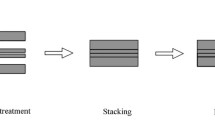Conclusions
-
1.
The absolute value of the scattering of the values of the ultimate strength of steels exposed to high temperature for long periods of time is ±8.5 kg/mm2 on the average for steels tested at 400–500°C for 100 h and 3–1.5 kg/mm2 at 500–600°C for 2000 h.
-
2.
The relative value of the scattering of the ultimate strength (with respect to the average value) remains almost constant for a given temperature and testing time. The scattering decreases with increasing testing time; it increases with increasing testing temperatures. At testing temperatures of 400–600°C the scattering is 5–12%.
-
3.
The ultimate strength measured at room temperature does not characterize the heat resistance of the steels. To ensure the heat resistance of 1Kh17N2 and ÉI736 steels, and particularly that of 1Kh12N2VMF steel, it is desirable to add a standard test or prolonged resistance at high temperatures to the TU specifications.
-
4.
The ultimate strength at high temperature decreases by 30–40% in the case of chronium steels tested for 100–500 h.
-
5.
The curves representing the variation of the ultimate strength tested for a long time at high temperatures (100–2000 h) have no inflection point. Since in most cases the scattering remains almost constant in tests exceeding 500 h, one can extrapolate the curves from 500 to 2000 h.
Similar content being viewed by others
Rights and permissions
About this article
Cite this article
Zakharov, I.I., Dolgova, A.M. & Andronov, D.P. Heat resistance of chromium steels subjected to prolonged tests. Met Sci Heat Treat 8, 13–17 (1966). https://doi.org/10.1007/BF00660155
Issue Date:
DOI: https://doi.org/10.1007/BF00660155




